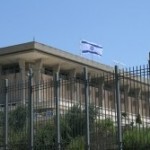 President Shimon Peres of Israel met on Monday morning with Jordanian King Abdullah II in the Jordanian capital of Amman, and the peace process with the Palestinians was among the topics discussed. According to a press release from Peres’ office, the two leaders discussed “various bilateral issues as well as ways to overcome obstacles in the peace process between Israel and the Palestinians, and exchanged views regarding recent developments in the region.”
President Shimon Peres of Israel met on Monday morning with Jordanian King Abdullah II in the Jordanian capital of Amman, and the peace process with the Palestinians was among the topics discussed. According to a press release from Peres’ office, the two leaders discussed “various bilateral issues as well as ways to overcome obstacles in the peace process between Israel and the Palestinians, and exchanged views regarding recent developments in the region.”
Prime Minister’s Office spokesman Mark Regev, in comments by phone with The Mideast Update, said, “President Peres’s comments were coordinated with the Prime Minister [Benjamin Netanyahu] and those comments included our ideas on how best to get the peace process restarted.”
The Jordanian PETRA news agency said the visit came after King Abdullah visited Ramallah last week and implied that Peres presented steps for restarting the suspended peace process with the Palestinians.
PETRA claimed Peres “elaborated during the meeting on the efforts that Israel could initiate in the near future to rebuild trust with the Palestinian Authority.”
The Palestinians have repeatedly demanded that Israel again freeze settlement construction and accept general Palestinian demands for territory, with the option of land swaps. Israel has so far declined to take those steps, instead repeatedly calling for the return to negotiations without preconditions.
The Palestinians suspended the peace process last year following the end of Israel’s unprecedented 10-month partial settlement construction freeze.
The Israelis have also disagreed with the Palestinians’ unilateral attempts to achieve statehood recognition via the United Nations. The Israeli President Office’s press release said that in his meeting with Abdullah on Monday, Peres “emphasized Prime Minister Netanyahu’s proposal to hold a direct Israeli-Palestinian meeting forthwith in order to advance the peace process. The President stressed that reaching a solution of ‘two states for two peoples ‘ will be possible only via direct negotiations and not through appealing to the UN.”
The press release noted Peres and King Abdullah plan to “continue their talks in the near future” and that this meeting was held “in a warm, friendly and open atmosphere.” Jordan has the relatively unique regional position of having an open relationship with both Israel and the Palestinians.
When asked if Israel is hopeful that Jordan will try to pressure or talk the Palestinians into returning to peace talks, Regev said, “I think that the Jordanians have played in the past and continue to play a positive role, a moderating role, and we always look forward to engaging with them.”
Both the press release and Regev highlighted the importance of Israel’s relationship with Jordan—one of the only Arab nations at peace with Israel.
“Israel has a strategic interest in the strength and the stability of the Hashemite Kingdom of Jordan,” said Regev. “We believe that the peace between Israel and Jordan is a foundation for stability in the region, and we will continue to act to cultivate that relationship.”
The press release said that prior to Peres’ trip to Amman he and Netanyahu “discussed the importance of strengthening the good strategic ties between Israel and Jordan.”
The discussions with Jordan come amidst ongoing efforts to restart peace talks by the Mideast Quartet—the United States, the European Union, Russia and the United Nations.
“We see the Quartet process designed to facilitate an early return to direct peace talks,” said Regev. “Israel remains ready for the immediate resumption of peace talks without any preconditions whatsoever.”
(By Joshua Spurlock, www.themideastupdate.com, November 28, 2011)
